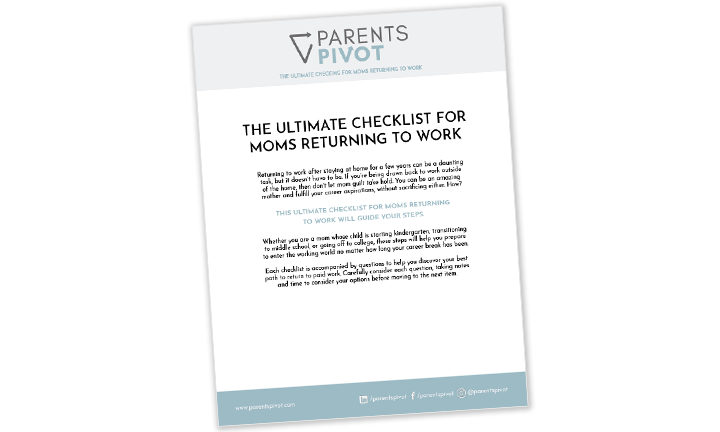How is your work/life balance during the quarantine?
While you’ve been home these last few weeks, you’ve likely found yourself unexpectedly juggling things you hadn’t previously. Trust me: You are not alone! It can be difficult to figure out organization for moms that works for our busy routines. Since schools, social engagements, and pretty much every other event have been closed, your life has changed massively. For many, this means working from home, children are at home instead of school, and a whole new life to manage without any of the usual activities. Throughout this process, you may have been asking for help from your family members, soliciting feedback from them, and initiating new structures throughout your home to keep the sanity. While it’s not easy, one silver lining is that the organization for moms that you are learning now is not just for moms at home - it’s transferable to the workplace!
As you’ve gotten closer to settling in to this new norm, consider some ways the organizational skills you’re sharpening are preparing you for the workplace. As a parent, you’ve been fully in charge of making changes (some that not everyone likes), improving workflow, and making transitions easier for those involved. Not everyone has the organizational skills it takes to do this. And it’s not easy.
Well, working mom, if transitioning an entire family’s routine and schedule during a world-wide pandemic isn’t something to boast about, nothing is. Today, start thinking about your organizational skills in terms of your own workplace skills. Take advantage of this situation by honing these skills during this crazy time.
Organization for Moms
Strangely, with the new lack of activities in your world, it can feel like there are more things to organize. That seems counterintuitive, but it is true. Before, you may have had a full day of work, daycare pickup, and dinner, and evening activities. You were in a routine that was familiar. Now, with this temporary hiatus of most of your normal routine, it’s time to adjust to these changes and sharpen those organizational skills.
Here are some organization tips to strengthen your skills while at home, so you can transfer them to the workplace later:
Time Blocking: Block off times on your digital or paper planner for specific tasks. If you don’t use a calendar or planner, now is the time to start. Even if you print off a weekly calendar to organize your to-do list, you will benefit immensely. Convert your to-do list to a calendar. If your kids need you to help with school work, block out time for each of them to get help. Consider any schedules the schools recommend and let your children know when to expect undivided attention from you. Block off time to focus on your own work or home needs. Time blocking puts you on a schedule, which will help you complete these tasks without the stress of constantly thinking about your todo list. But don’t forget to block off time for meals and fun activities, too!
Activity Batching: If you have several of the same types of activities, consider activity batching. Activity batching allows you to group similar activities together in your schedule so that you are more focused, your work is more streamlined, and you encounter less distractions.
Michael Hyatt, an expert on activity batching, suggests that as you are more productive when you batch activities, you will spend less time on them, which frees up more time for other activities. Take a look at your own schedule and consider similar activities that you can batch together to streamline your workflow. Batch together similar cleaning activities or work activities. And use the quarantine to improve your activity batching now; in the workplace, this organizational tool will save you time and create more efficient work completion. Employers look for that in applicants.
Problem-Solving: At the end of the day, take some time to reflect on what went well and what did not. If you find something was a major problem that day – either a time suck or seemed unnecessarily taxing – spend some time identifying and solving the problem. If your children fought you every step of the way, brainstorm some ideas to find a solution that helps both you and them. If you found that it felt impossible to complete your own work, look at your schedule and see what can be done about this struggle. Consult others, do research online, and spend time on these thoughts. Solving these problems can significantly cut down on your daily stress and improve this at-home experience drastically. It’s worth the time and is a habit that, once developed, you can take with you to the workplace.
Frontload Tasks: Frontloading tasks when possible is an incredible way to invest time and energy into organization. Just like some people set their clothes out the night before or plan their meals for the week, frontloading is always an investment in the near future and your mental health. Consider some tasks you can do ahead of time. Batch them together and chunk them into your calendar. Maybe meal planning is more feasible since everyone is home right now. Get them in on the action and plan your meals for the week; you might even schedule who is going to start the meals or clean up each night. You may also save time by scheduling your bills to be paid--either automatically or just for the month or week. This saves time later, when you’d pay each individually as they come. In the workplace, frontloading skills show that you can anticipate what’s coming, plan for it, and make it less stressful.
Cutting the Fat: Now is the perfect time to cut out things that are not necessary for your family. Do you have subscriptions or memberships you’re paying for that you’re never using? Cut them out of your budget. Is your family over-committed to activities and regular events that you now realize aren’t helpful like you’d thought? Commit to skipping those when they start back up. In the workplace, cutting fat saves time, money, and energy. Take a critical look at what your family is spending time, money, and energy on and find things to cut. And when you’re interviewing or at the workplace, tap into this lean organizational skill as a reason you are a valuable resource.
Take advantage of this opportunity to sharpen your organizational skills as a mom. Take it a step further by maximizing your time management skills with these other tips on maximizing your work and home during this quarantine. Should you find yourself needing additional support, Parents Pivot is here for you! Set up a coaching call for one-on-one help!








